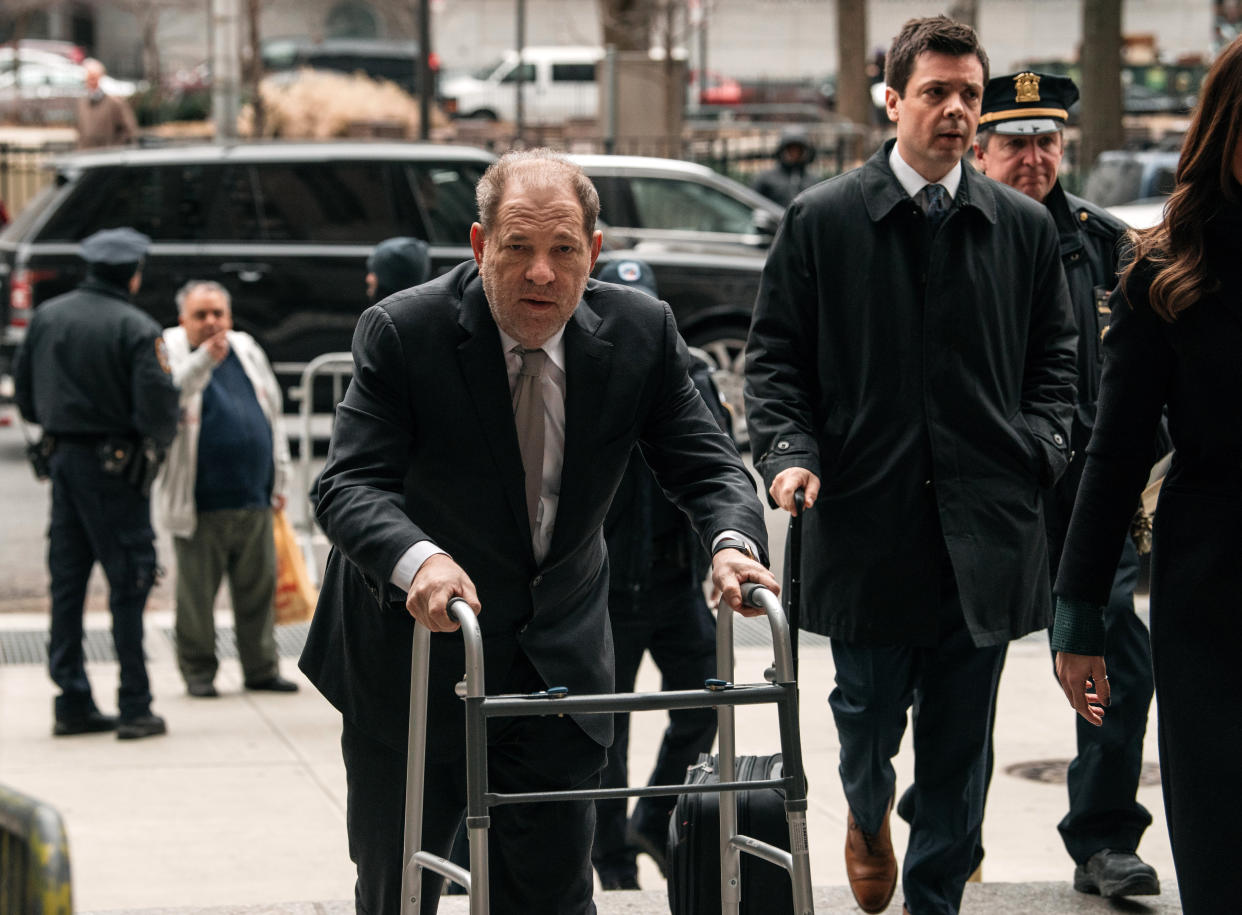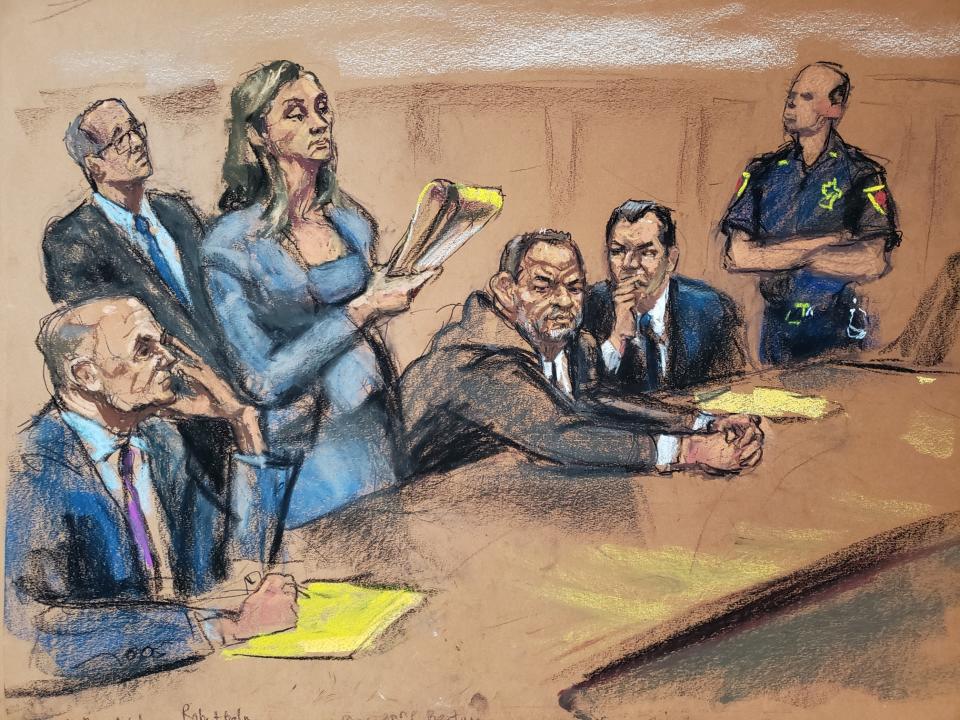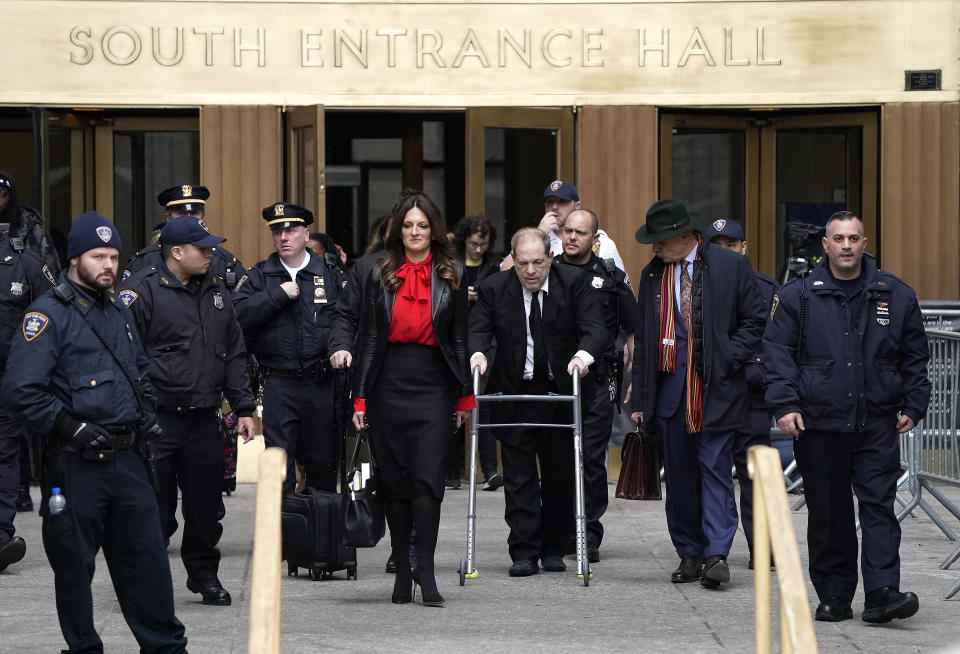I was rejected as a juror for Harvey Weinstein's trial. Here is what happened inside the courtroom.

I remember right where I was when news of the Harvey Weinstein scandal broke in 2017 — sitting at my desk, wrapping up a day of work as a lifestyle editor, when a colleague said, “Oh, my God!” and posted a link to the New York Times story in Slack, and we — women, all of us — devoured it immediately, with equal parts horror and recognition and schadenfreude.
I will now also always remember the exact, sinking instant I realized I could possibly wind up deciding Weinstein’s fate, as a trial juror.
Between those two moments came days and months and then years of following the ever-unfurling narrative — of allegations detailing hotel rooms and bathrobes and showers, of #MeToo and codes of silence and loyal wives (some of which I even wrote about), and oft-heated discussions about consent and sexism at work and at dinner with friends and at family gatherings.
All of that baggage came along with me last week, as I clutched my red-and-white jury duty summons and arrived at New York City Criminal Court, an imposing collection of limestone art deco towers, fronted, on that morning, by a buzzing crowd of paparazzi. Though I knew the Weinstein trial had begun and understood that the crowd was awaiting his arrival — and even noticed a stable of camped-out reporters and photographers in the hallway of the very floor I’d been instructed to report to — I felt certain I’d have nothing to do with this famous high-profile trial. It would have been just too absurd.
It was only after an hour and a half of waiting around in the main jury room, when a court officer led over 100 of us down the hall, past the reporters and into a courtroom, that I fully understood what was going on. That’s when I stepped through the doors, noticing a wild-haired, bespectacled courtroom sketch artist seated to my right, in the back row, adding finishing touches to the colorful, pastel closeup of a face of a human who was by now unmistakable: Harvey Weinstein.

My heart racing as I took a seat in a wooden bench just a few rows in front of her, I peered around the other potential jurors’ heads up toward the front of the courtroom.
First, I saw the walker. And then, Weinstein himself.
He was seated with his back to all of us, facing the judge, surrounded by members of his legal team. He wore a dark suit, his pate was gray and balding, his pallor gray. He looked hunched and small and unwell. Justice James Burke addressed the room from high above, thanked us for our service and told us what case this was: “The People of New York v. Harvey Weinstein.” People gasped. A woman seated up front said, “Oh s***.” The mood in the room became decidedly strange.
“This is crazy,” I whispered to the woman on my left, who just closed her eyes and slowly shook her head. The man on my right had seemingly no reaction. I kept my eyes trained on the back of Weinstein’s head as the judge continued speaking, letting us know that that we’d be dismissed early and return in the morning, adding that simply having heard of the defendant did not disqualify us from service. Burke implored all of us, in fact, no matter what we knew or didn’t know, to spend the night “examining our conscience,” and considering whether or not we could be “fair and impartial jurors” in this trial. He waxed poetic on the virtues of jury duty, and how positive an experience it is for the majority of people who serve. He then shared with us the specific charges against Weinstein — four counts of felony predatory sexual assault, one count of criminal sexual act in the first degree and one count each of first-degree rape and third-degree rape — so we could let it all sink in.

I felt sick as I left the courtroom, jamming myself into an elevator with other prospective jurors. I wanted to call out, “That was surreal!” but everyone was so stunned and silent that I just kept quiet too. I walked to the subway, my nerves jangled. What if I got picked? What if I should get picked? Could I really be fair and impartial?
That night, I followed the judge’s suggestion to soul-search. Which was hard, after two years of obsessing over details of the case and thinking and writing about the allegations and listening to the accusers speak — and of thinking about the friends I have who have been raped or harassed and of meditating on my own experiences with sexual harassment, and of what my tween daughter will likely one day face in this world.
I slept fitfully that night. But I felt sure by the morning of what I’d have to do.
Back at the courtroom, I wound up seated in the very front row, with nothing between Weinstein and me but the walker. He was already at the table before the judge with his legal team when we arrived, and now, at this close range, I could see that his left shoulder drooped down deeper than the right and that the white collar of his shirt was crooked, half-tucked into the back collar of his blazer and half sticking out. He was hunched over pages of what looked like a transcript, making notes in the margins, and while one word kept echoing through my brain — karma, karma, karma — I did almost feel sad for him.
To his right was power attorney Donna Rotunno, with her angular cheekbones and chunky glasses, wearing a blood-red pussy-bow blouse under a fitted leather blazer, looking scary, making me shudder at the thought of being cross-examined by her.
As the entirety of the jury pool filed in, she and the other attorneys — including those on the other side, from the district attorney’s office — kept turning in their seats to study us, as if trying to discern who looked fair, who looked biased, who looked crazy. Some scribbled down notes.
Once everyone was settled, Justice Burke repeated his spiel from the day before. Then he introduced the defendant, asking him to please rise and say hello to us all, as if we were at a party. Weinstein stood slowly, with effort, and turned around to face the courtroom. “Hello, everybody,” he said, forcing a smile. I noticed he looked ashen and more pockmarked than usual before he twisted back around into his seat. Burke then introduced all of the attorneys, who also rose to greet the room, and then asked if any prospective juror knew any one of those people. A few shared that they did — with one woman admitting that she was friends with Rotunno and another noting that her friend had had an “encounter” with Weinstein.
Next came the big question of the day: “Who among you believes you cannot be a fair and impartial juror in this particular case?” I wasn’t quick enough to count, but I turned around to look, and nearly half the room raised a hand. Including me.

Right or wrong, I had my mind made up about Weinstein. And it felt only right to admit it — even if I did have to stand in my seat and hold a microphone and say and spell my name in front of everyone. I appreciated that the judge did not want reasons at that moment — and that the question had been posed so directly, unlike in other, more formal voire dires I’d been involved with in the past, in which admitting bias without articulating it outright (“I own stock in that company,” “I was mugged once,” “My dad is a cop”) was the norm.
Just then, after a couple more screening questions, as the session was wrapping up for the afternoon, a thunderous wave of women’s voices poured through the windows of the courtroom from the street 15 floors below. It was chanting, fierce and powerful, almost like a song, backed by the unwavering beat of a drum. Though it was nearly impossible to make out the words being shouted, I did hear one statement — “And the rapist is you!” — loud and clear.
And so, it seemed, did Weinstein, whose face, which was turned toward us in profile in that incredibly chilling moment, looked stricken.
Read more from Yahoo Lifestyle:
Michelle Williams called an 'icon' after powerful speech about women's rights at Golden Globes
Gwyneth Paltrow talks about her place in the #MeToo movement: ‘No one’s going to f*** with me’
Follow us on Instagram, Facebook and Twitter for nonstop inspiration delivered fresh to your feed, every day.



